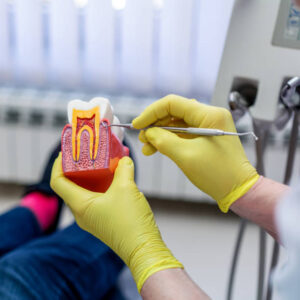Understanding What a Dental Implant Is
Before exploring when they’re advocated, it’s beneficial to recognize what implants are.
A dental implant is largely an artificial tooth root crafted from titanium or zirconia. It’s surgically positioned into the jawbone, which it fuses with the bone in a way called osseointegration. Once stable, the implant can guide a crown, bridge, or denture. Unlike detachable dentures, implants are everlasting, fixed solutions that exhibit characteristics like natural teeth.
When Dentists Recommend Dental Implants
Dentists don’t routinely endorse implants for every missing tooth state of affairs. Instead, they recollect a range of factors. Here are the most common instances wherein implants become the pinnacle of advice:
1. Single Tooth Loss
If you lose one tooth because of trauma, decay, or extraction, an implant is frequently the satisfactory way to replace it. Unlike a conventional bridge, which calls for grinding down adjacent teeth for a manual, an implant preserves the surrounding healthy tooth. Dentists advise implants right here because
- They keep the herbal enamel structure.
- They prevent jawbone loss inside the space.
- They look seamless compared to an actual tooth.
For someone who values each look and oral health preservation, an implant is nearly always the desired route.
2. Multiple Missing Teeth in a Row
When several enamel is lacking from facet to facet, implants can serve as anchors for an implant-supported bridge. Instead of replacing every tooth with a separate implant (which may be highly priced and invasive), extra implants can guide a chain of crowns.
Dentists often recommend this approach, as it
- Restores chewing performance.
- Offers a fixed solution as compared to removable partial dentures.
- Distributes bite pressure lightly.
3. Full Arch Tooth Replacement
If all top or lower teeth are lacking or want to be extracted because of extreme decay or gum disease, dentures were once the most effective choice. Today, implant-supported dentures or complete-arch answers (inclusive of All-on-4 implants) are the trendy gold standard.
4. Severe Bone Loss Concerns
One of the biggest headaches of lacking teeth is jawbone resorption—the slow shrinking of bone in the absence of tooth roots. Dentists propose implants early in those cases due to the fact that they stimulate the bone, similar to natural enamel roots.
By placing implants quickly after extraction, sufferers can keep away from the “sunken face” look frequently associated with long-term denture wearers.
5. Difficulty with Dentures
Not everybody adapts properly to removable dentures. Others struggle with speech or worry about dentures slipping at some stage in food or in conversations.
In such conditions, dentists recommend switching to implants due to the fact:
- They cast off the embarrassment of slipping dentures.
- They enhance speech clarity.
- They allow for a wider variety of meals.
For a person who needs both security and confidence, implants become the better long-term option.
6. Chronic Tooth Decay or Gum Disease
When herbal enamel is critically compromised and cannot be stored—despite root canals, crowns, or periodontal therapy—implants may be advocated as replacements.
Dentists typically don’t forget this after comparing whether herbal teeth are salvageable. If decay or gum ailment has caused irreparable damage, getting rid of the affected teeth and replacing them with implants can restore oral health and save you from dental issues.
Situations Where Implants May Not Be Recommended
It’s similarly vital to recognize when implants won’t be the first option. Dentists might also keep away from recommending implants if:
- The affected person is too young, and their jawbone hasn’t fully developed.
- There are uncontrolled medical conditions, including extreme diabetes or cancer treatments.
- The patient is a heavy smoker, unwilling to lessen tobacco use (because smoking slows healing).
- A great untreated gum disorder.
In those instances, dentists may additionally recommend opportunity solutions or preparatory treatments like bone grafts before considering implants.
Benefits That Drive Implant Recommendations
Dentists lean closer to recommending implants since they provide benefits unrivaled with the aid of other tooth-replacement alternatives:
- Natural Look and Feel – Implants are almost indistinguishable from real teeth.
- Durability – They final decades, often an entire life.
- Bone Preservation – They prevent jawbone shrinkage.
- Improved Chewing Power – Patients can consume crunchy or chewy ingredients quite simply.
- Speech Improvement – No slipping or lisping like with dentures.
- Boosted Confidence – A permanent, attractive smile improves vanity.
What Happens If You Delay Implants When Recommended?
Ignoring a dentist’s advice for implants can have long-term consequences:
- Bone loss worsens with time, making implants harder or impossible later.
- Shifting of the closing tooth may cause bite problems.
- Facial sagging can broaden as the jawbone resorbs.
- Reduced remedy options if the gap has been left unfilled for too long.
That’s why dentists pressure timely implant placement each time it’s viable.
Conclusion
Dental implants are advocated while patients want the most natural, everlasting, and health-retaining answer for a lacking tooth. Whether it’s a single misplaced tooth, multiple lacking teeth, or an entire arch opportunity, implants offer unequaled stability, aesthetics, and self-belief.
That stated, the choice usually is based upon a person’s or a woman’s needs, fitness conditions, and way of life elements. A thorough consultation with a dentist or oral health care company is essential to determine if implants are the right preference.
If you’re thinking about teeth replacement alternatives, ask your dentist without delay: “Am I a candidate for implants?” If the answer is yes, probabilities are they’re being recommended due to the truth that they provide you the amazing direction toward a healthier smile and a better quality of life.





